Our brand new Spider-Man, as introduced in Captain America: Civil War, is only fifteen years old. Take that in for a moment. He is fifteen. A decade-and-a-half old. He wasn’t even born in the 20th century, which is pretty much a first for the Marvel Cinematic Universe.
It’s exciting because none of the previous screen Spider-Mans have been truly teenage-like (mostly because they were being portrayed by adults). And it’ll be great for the current audience of kids, who can view Peter as more of an avatar. But the really cool part? This Spider-Man grew up in an age full of superheroes—and it’s bound to shape his worldview in a way that these films have never been able to address before.
Let’s put this all into perspective: Peter Parker was likely born in the year 2000. That means he was barely a toddler when the World Trade Center was hit on 9/11, making that event less impactful for him than it is for the Millennial set. We know that the MCU had a concept of superheroes in some fashion or another before the current explosion—Captain America was revealed post-World War II as an enhanced super soldier, and Ant-Man was a rumored hero in the Cold War, even if no one ever found any proof. So it’s wasn’t impossible to conceive of super peoples, even if they didn’t have much to do with current everyday life.
The MCU films have largely existed in realtime—meaning however much time has passed between films, the same amount of time passes in their universe. Once we hit the events of Captain America: Civil War, the Avengers have been a known team for four years. It also means that Peter Parker was eight years old when Tony Stark told the world that he was Iron Man back in 2008. And that a month or so later, the Hulk and Abomination tore up Harlem, a short subway ride away from Peter’s home in Queens. (I’m assuming that he has lived in Queens roughly his whole life until it’s mentioned otherwise; it’s possible that his parents lived close to May and Ben prior to their deaths.) Then, when Peter was roughly twelve, he looked out the window of their apartment building and saw explosions and strange flying creatures in Manhattan. The Battle of New York would have been immediate to him, and to everyone he knew.
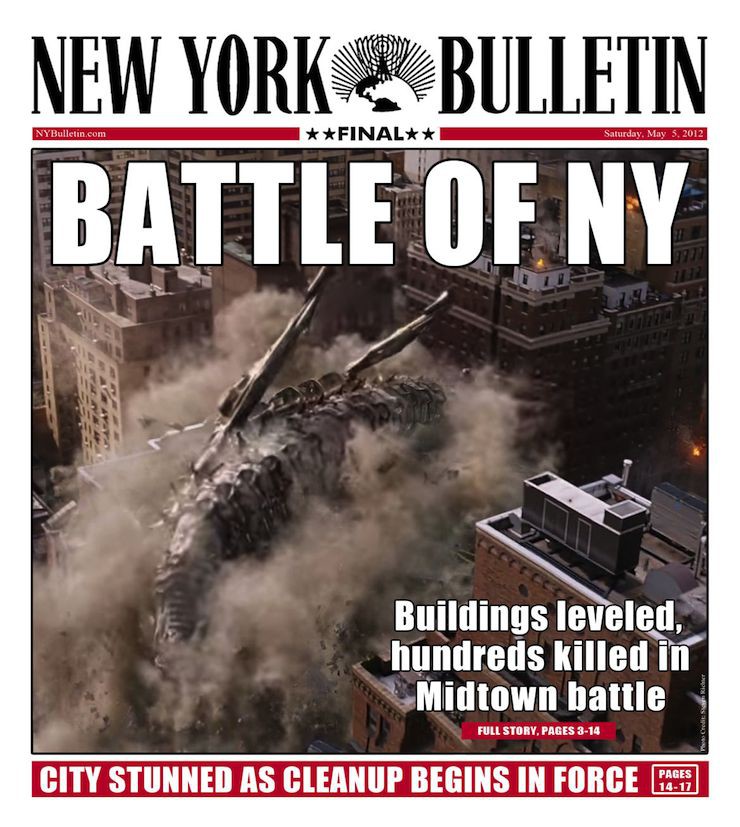
This means that Peter Parker has grown up in a world where super powered people have basically always been around. Moreover, he has grown up in a world where more of them are coming out of the woodwork every day. These are the heroes for his generation. Instead of a never-ending stream of superhero media, Peter’s lot are growing up with the real deal, and are likely every bit as obsessed as fans are on our side of the fence. Kids wandering school halls with Captain America shield backpacks, papering their lockers with paparazzi photos of the Avengers, dressing up for Halloween as their favorite member of the team. Adults who frequent internet hubs to trade theories on how Mjolnir works, who have tattoos of Widow’s hourglass and Hulk’s silhouette, who send applications into every open position at Stark Industries “just in case.”
It’s part of the reason why Peter’s meet cute with Tony Stark in the middle of Civil War works so well—Peter is clearly completely familiar with Tony, and not just because he happens to be a famous engineer and fellow tech nerd. Peter knows Iron Man. Old Shellhead has already been around for half the kid’s life.
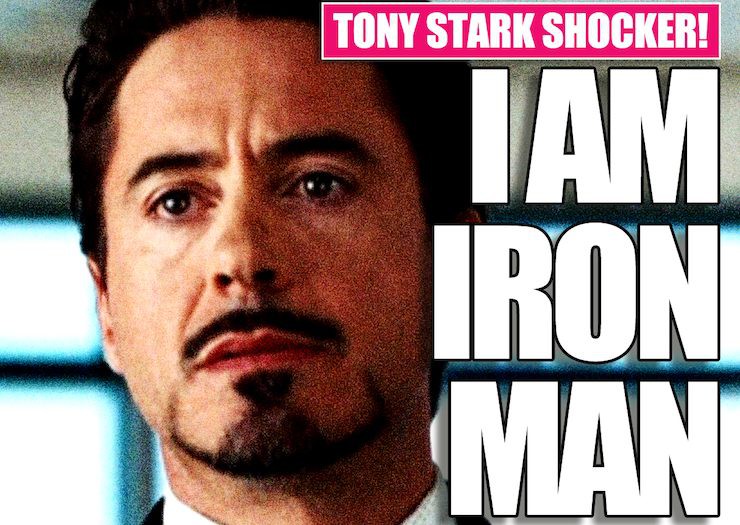
With that in mind, Peter’s decision to become Spider-Man following the emergence of his powers isn’t simply a given according to his origin story—it’s logical. What else is he going to do with his abilities when he has an ample number of examples to follow? And this is before Tony Stark showed up on his doorstep and volunteered to make his persona a bit more official by upgrading him with a brand new suit and his own logo.
Of course, Peter Parker being so young means that his cultural touchstones are far different from that of his evil-fighting peers. Which begs an interesting query: In a world where superheroes are part of the IRL zeitgeist, what sorts of mass media are kids consuming?
Spider-Man’s comment about The Empire Strikes Back being a really “old” movie makes it clear that Star Wars isn’t really on his radar in a big way. (This makes a lot of sense, even with the recent release of The Force Awakens; by Peter’s timeline, he received his powers in roughly November of 2015, making it highly unlikely that he had time or inclination by December to go see Episode VII in theaters.) There are other big properties and companies currently turning out blockbusters—Star Trek, Fast and the Furious, Disney and Pixar films, James Bond and Harry Potter. But nothing fills the gigantic gap left by the influx of superhero media that we’ve seen in the 21st century so far.
We cannot assume that DC Comics are a thing in this universe as the chances of their characters ever being mentioned in canon are slim (for rights reasons), which is basically the same as not existing. Other Marvel properties that don’t apply to the MCU continuity (The Fantastic Four, X-Men) can’t exist as fiction because Marvel will want to keep the door open for deals and rights reacquisition, especially now that it’s already proved useful in Spider-Man’s case.
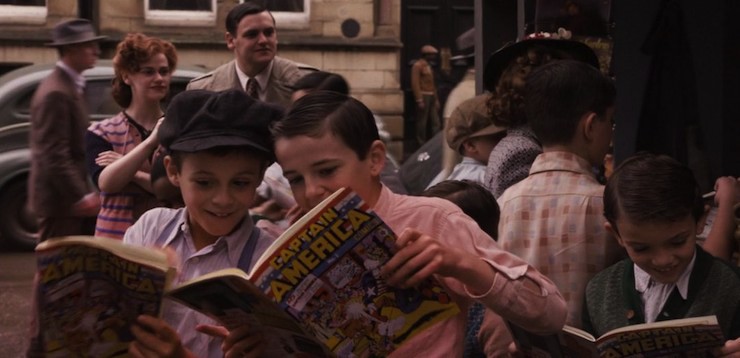
We know that comics themselves were popular in the MCU during Cap’s tenure—there is a series featuring a fictionalized version of Steve Rogers being produced during WWII, and also a radio show, so it’s likely that superhero-type media evolved from there. Perhaps they have some comparable figures, but they don’t seem popular enough to be prevalent in general culture. Tony Stark is famous enough to be the subject of biopics and such, which we know thanks to the casting of (spoiler) Nathan Fillion as Wonder Man/actor Simon Williams in the forthcoming Guardians of the Galaxy Vol. 2. It’s entirely possible (more like probable) that there are filmmakers clambering for the chance to adapt these Avenger-fought battles for film or mini series, but it creates a different environment entirely because all of these works would be “Based On A True Story.” Cathartic for some viewers, informative or misleading to some, and grossly inappropriate to others.
All of these possibilities lead to a different pop culture landscape for Peter and his contemporaries. And that’s also without asking how much Stark Tech gets into the hands of the public each year—if these kids have the ability to buy Stark smartphones in the same stores as the latest iPhone, that’s a horse of a different color all around. (A deleted scene from The Avengers showed viewing screens and interfaces on the streets of New York that at least looked like Stark Technology, suggesting that Stark Industries might have a commercial side that provides pretty things to everyday consumers.) Are these kids growing up on virtual reality? What about Tony Stark’s therapy app—will it be an aid used by counselors at Peter’s school? What sort of groups have developed as a result of being exposed to aliens and gods and monsters? Is there a black market for fake super-soldier type drugs, and do kids try to get their hands on them?
There’s also that pesky fact of frequent invasion forces coming to Earth and blowing things up. When you set the current global stage with a minefield of unknown enemies and world leaders who actually consider nuking New York City in an effort to contain an attack, the problems of individual people kinda seem like small beans. And that’s when you realize…
…what those people could actually use in their lives is a friendly neighborhood Spider-Man.
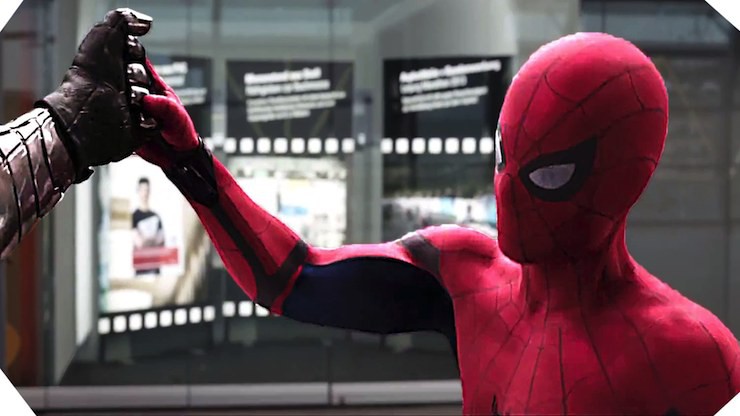
In that context, the web-slinger becomes a different kind of symbol right at his inception. Peter Parker may still have become Spider-Man because of his uncle’s death, but the choice has even more weight attached when the stage he’s stepping out onto needs more people like him—more heroes who are willing to work at the ground level. (We’ll have the Defenders eventually on Netflix, but they still combat some pretty big foes, even individually.) This world is changing so quickly that the presence of a guardian who cares about drunk drivers and stolen laptops has potential to be more of a comfort than Captain America or Iron Man.
Tony Stark seems to think so, at any rate. He doesn’t hand over his handmade super suits to just anyone.
Emmet Asher-Perrin really wants Spider-Man: Homecoming to just be about Peter’s high school woes with the occasional montage of Spider-Man helping kids get home safe at night and interspersed with helping Tony build random stuff in the Tower. You can bug her on Twitter and Tumblr, and read more of her work here and elsewhere.










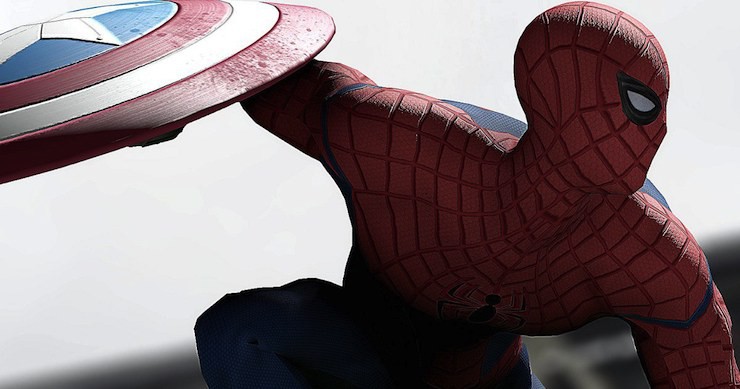
This article suggests there might be something interesting in a Spiderman origin story after all. How does he make the choice to stand by in a world with superheroes? Especially if it happens after the various Netflix series in “Hell’s Kitchen.” If Peter is a fundamentally decent person, how could he not follow the example of DareDevil or Iron Man the moment he had his powers?
In a world where superheroes are part of the IRL zeitgeist, what sorts of mass media are kids consuming?
Of course it’s pirate comic books. It is known.
In MCU they are probably having the reboot of The Black Freighter and people are wondering if there’s pirate movie fatigue.
One clarification: The Incredible Hulk doesn’t take place in 2008, because it was retroactively established as happening simultaneously with the events of Iron Man 2 and Thor. In the closing scene of IM2, when Tony has his meeting with Fury, we see news footage of the university battle from TIH. And the tag scene of TIH, with Tony speaking to General Ross on behalf of SHIELD, only makes sense as a followup to IM2. Here’s the MCU Wiki’s version of how the events of the three films overlap in 2011.
“We cannot assume that DC Comics are a thing in this universe as the chances of their characters ever being mentioned in canon are slim (for rights reasons),”
Ah, come on, I hope they risk it all and have a scene where Spider-Man says “I’m Batman.”
@1: Some interpretations of the character have had him as, before Ben’s death, being maybe a generally heroic guy, like if he saw a major crime happening he’d intervene, but still needing to make money (particularly to support his family), hence the wrestling, and human enough where if a promoter screwed him and somebody robbed the promoter, saying, “Not my problem.” I could easily see him having, at first, an attitude of “let the real heroes handle it I’m not really trained for this stuff” while he’s still new to his powers.
@@.-@ That’s fairly plausible and still supports what he says to Tony in CA:CW.
I really hope the movie engages with some of the points raised in the OP though. It’d be a nice addition to the superhero movie genre. Especially if the alternative is yet another origin story.
@4/ghostly1: And don’t forget the bit in the first Sam Raimi Spidey movie where Aunt May tells Peter, “Remember, you’re not Superman.”
(Although there was that one time when Doc Ock didn’t know the difference…)
@@.-@: There’s definitely room for even more DC-Marvel fun:
“Kids wandering school halls with Captain America shield backpacks”
The pilot for Agents of S.H.I.E.L.D. confirmed the marketing on superheroes, and a later episode even mentioned Captain America lunch boxes.
On the question of the equivalent of superhero movies, the last season of Peggy Carter (I would so much like to say “latest”…) has Howard Stark making a movie about another Marvel character (Kid Colt); it’s a biopic. There’s no reason movies similar to the ones we know actually exist. The radio show based on Captain America’s life, made only a few years after his death, gives us a good idea of how different the fictional movies could be from ours though. On a related subject, another Agents of S.H.I.E.L.D. episode has raised an important question by confirming that Doctor Who exists in this universe (the show, not the character. Or does he?). What kind of stories can be told in a world where aliens have actually attacked London?
I think that the fact that we don’t SEE something like DC Comics in the MCU doesn’t mean that it doesn’t exist. I think of how products like James Bond or Mission: Impossible appeared during the Cold War or Jason Bourne and the like or any of a dozen black ops video games appeared during the War on Terror. As media consumers, we’re well aware of the “real” operators interacting with dangerous situations out there, yet we don’t have access to the actual stories going on and therefore create fictional versions even in a world without superheroes. I think that it’s pretty comparable to look at fifty years or more of how we’ve created spy fiction and the like to explore our interest in something that we know is out there and see pieces of in the news (but don’t know the full details of, even if we sometimes see the twisted remains after attacks) and extrapolate how a world with superheroes might explore similar cathartic needs and desires to be part of the action. Why not have another “universe” of heroes that the reader or viewer in the MCU can identify with while considering what-to-them-is near-real-world-events. Batman and his wonderful toys in that sort of world can act to explore the questions of a man like Tony Stark “privatizing” world peace in a distant way that a biopic couldn’t just the same that a Bond movie allows us to look at relations in the Cold War in a different way that watching the news can.
Maybe they could retcon Ang Lee’s Hulk as a heavily-fictionalized and poorly-reviewed in-universe movie about the Hulk …
@9/bhaughwout: It’s been a conceit of Marvel Comics since the early days of The Fantastic Four that Marvel Comics exists in-universe as a publishing company that puts out fictionalized accounts of the real superheroes’ adventures. The early FF issues were full of metatextual humor where the Thing or the Torch referred to themselves as comics-magazine heroes, and in Dr. Doom’s second story, he actually breaks into the Marvel offices and forces Stan Lee and Jack Kirby to lure Reed Richards into a trap by asking him to come into the office for a story conference. It’s downright Deadpool-like in its fourth-wall shattering, except it’s justified as the comic being an in-universe dramatization of their real adventures. And lots of other Marvel comics over the years did similar gags incorporating the real Marvel staffers as characters in-universe.
Of course, while those early FF issues took the Watsonian route of implying that the issues we were reading were the actual in-universe dramatizations, it was later established that the in-universe Marvel comics were different from the real-world ones, at least for characters that had secret identities. For instance, the in-universe Spider-Man comics invented a fictitious secret identity and origin for Spidey, since nobody knew who he really was.
Which is better than the way it was done in an early-’40s Superman comics story tying into the Fleischer animated shorts. The story has Clark and Lois going to see a Superman cartoon (a nonexistent sequel to the first cartoon), with Clark creating various distractions to prevent Lois from seeing the parts of the cartoon that reveal Clark is Superman. And yet the fact that everyone else in the audience is privy to Superman’s secret identity is ignored, as is the question of how the cartoon’s makers knew it in the first place.
@6/Christopher – I loved that bit! I was going to mention it in this context, too, but I guess (splitting nerdy hairs) the Sony Spider-Man movies aren’t part of the MCU…
@8/Athreeren – What kind of stories can be told in a world where aliens have actually attacked London? Didn’t they used to say the same things before 1969? “What kind of stories could you possibly tell in a world where we’ve been to the Moon?” Or pick any other amazing and fantastic thing that’s ever happened. Surely the denizens of the MCU are wired for storytelling, including the fantastic variety, as all humans are!
@12: It’s different, because the Moon Landing was inspirational, so no one will mind if you tell similar stories. But making fiction about alien invasions is a different thing. It’s as if in a post 9/11 world, you had movies where the hero defeats the bad guy while levelling a big city in the process, with no regard for the victims…
OK, I see your point. But I do hope that Doctor Who would be more sensitive than Man of Steel.
@13/Athreeren: It would be hard not to be more sensitive than Man of Steel. But there were plenty of WWII movies made during and after WWII. And the Japanese made Godzilla just 9 years after Hiroshima and Nagasaki, largely as an allegory about them (and a veiled protest of subsequent US nuclear testing that had endangered Japanese lives and taken at least one).
I’m going to be pedantic and point out that London did get attacked by a big alien spaceship in Thor 2.
(Well, Dark Elves, not aliens, but I doubt you’d bother making the distinction if you saw it)
Marvel used to have rights for the Dr Who comics, but not any more, so at one point he was part of the Marvel multi-verse.
@15/phuzz: I think that’s exactly what Athreeren meant — how would Doctor Who be perceived by people in the MCU, where an alien attack on London is a historical fact?
@8: “On a related subject, another Agents of S.H.I.E.L.D. episode has raised an important question by confirming that Doctor Who exists in this universe (the show, not the character. Or does he?). What kind of stories can be told in a world where aliens have actually attacked London?”
I bet if nothing else, their version of DW at some point had an episode where one version of the Doctor met Cap.
Maybe instead of Cap’n Jack we had Cap’n Steve in the TARDIS, his disappearance in WWII cover for being recruited into the Time Agency, and still flirting with everything that moved… followed by some embarrassment when the real Cap turned up alive. But when real Cap meets young Doctor Who fans he pretends that he really DOES know the Doctor.
Otherwise? I could see the show going more or less as we know it. Most of the show took place before anything REALLY unusual was well-known in the MCU. After that, he was already tradition, and they probably still use him under the theory that he’s why England, and the Earth as a whole, aren’t attacked more often. Or maybe come up with some explanation where he’s locked out of the present day but can still have adventures in the past or far future (something I kind of wish they would do on real DW but they never will).
@17/ghostly1: “Or maybe come up with some explanation where he’s locked out of the present day but can still have adventures in the past or far future (something I kind of wish they would do on real DW but they never will).”
That’s pretty much exactly what they did for the first three years of the series in the ’60s. The Doctor’s 1963-English companions came aboard by accident (or rather, were essentially abducted by the Doctor), and though he eventually tried to get them back home, he couldn’t control the TARDIS and so they ended up everywhere but 1960s Earth. The first time they did get back to their own time, they were miniaturized to the size of insects. After that, there were a few brief stops in the present when they didn’t have the luxury of staying for more than a few minutes, and we didn’t have a full story with the characters facing a threat in present-day England and interacting with the authorities until “The War Machines” at the end of the third season.
Of course, a few years (and two Doctors) later, they reversed that by having the Doctor exiled to near-future Earth and unable to leave.
@17: Alternatively, Steve might’ve met someone during WW2 who served as inspiration to the Doctor’s creators. Or more than one inspiration.
One thing: Peter can pretty likely be a Star Wars fan, as much as any 15 year old can be so in the real world. His mention of ESB as “a really old movie” actually struck me of him trying to downplay his nerdiness, to not seem as dorky to the adult superheroes he’s fighting alongside (and against).
@2 – Ryamano: Lol, I thought about that too.